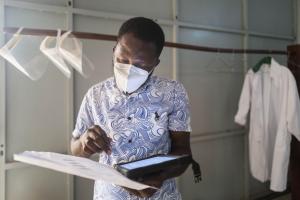What’s the cause? Certifying deaths in sub-Saharan Africa
Brazzaville – About two thirds of countries in the African region do not have reliable data on births, deaths, and causes of death, a recent World Health Organization (WHO) assessment found. The absence of this crucial information complicates effective health responses and policy-making in region.
It also suggests that countries are unable to provide timely insights into population growth and patterns across the regions of a country, as well as when, where and why people die. Only four countries in the region register more than 90% of deaths, according to the study.
“Cause of death data are critically important because they define our public health interventions,” says Dr Benson Droti, who heads the Health Information Systems team at the World Health Organization (WHO) Regional Office for Africa. “Not having these statistics available jeopardizes the effectiveness of health interventions across the region,” Dr Droti points out.
WHO recently held virtual trainings for more than 500 health professionals from 42 African countries on medical certification of cause of death and the eleventh revision of the International Classification of Diseases (ICD-11). The training also detailed methods for community reporting of deaths, how to conduct verbal autopsies and rapid mortality surveillance. The International Classification of Diseases is the global standard for reporting diseases and related health conditions. It ensures data comparability within and across countries.
“[In South Africa] we’re trying to assess the effect of COVID-19. If you don’t count [deaths] accurately, then you don’t know what’s going on and it’s hard to plan and harder to respond,” says Dr Lyn Hamner, Co-head of the WHO Family of International Classification Collaborating Centre in South Africa, who attended the training.
Mauritius is the only country in the region that fully documents causes of death. Its civil registration system has systematically monitored deaths during the COVID-19 pandemic. Nasser Jeeanody, the chief health statistician at the country’s Ministry of Health, says that no excess deaths have been observed during the pandemic, in which 10 people died and 467 infected with the virus.
Introduced in 1957 and digitized in 2005, Mauritius civil registration system has continuously been reinforced and made prominent, says Jeeanody. Vital statistics are required by law. A certificate of death showing the cause of death is a requirement before burial or cremation.
Sooneeraz Manohur, the chief health records officer, also at the Mauritius Ministry of Health, explains that the country’s 1.3 million people mostly live in the capital city, making it possible to track deaths and issue death certificates.
In most African countries, about 70% of deaths occur in communities where structures to certify and report deaths and their causes do not exist. Even for deaths that occur in health care facilities, their causes are either poorly certified or not certified at all.
“It is likely that countries in the African Region are grossly underreporting their deaths and are also unaware of the leading causes of deaths in their countries because they are unable to count or certify every death,” says Dr Droti.
WHO in the African Region has now prioritized support to countries to improve cause of death reporting using international standards. It plans to hold further trainings to assist countries in accurately certifying causes of deaths and develop strategies and policies aligned with the country’s national health information system.
In May 2019, the World Health Assembly endorsed the eleventh revision of the International Classification of Diseases and recommended that all countries adopt it by January 2022.
“The African Region has largely lagged far behind in the implementation of the earlier versions of the International Classification of Diseases. We will ensure that it is not the case this time,” says Dr Droti.



